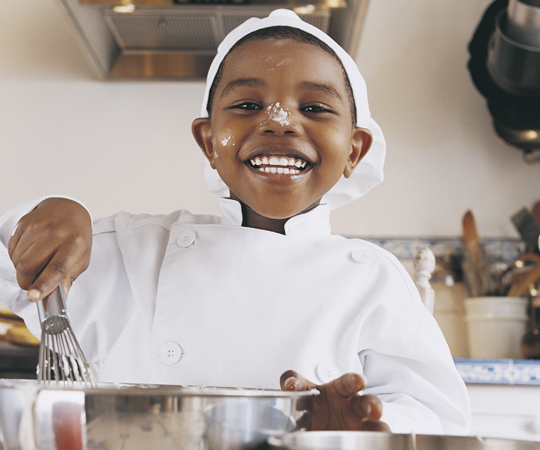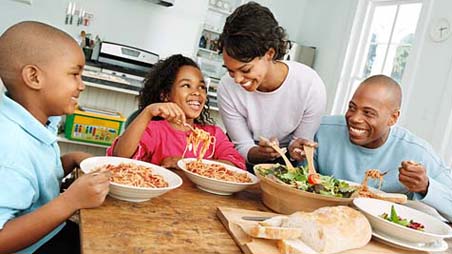Kid Chefs – 6 Tips to Getting Children Involved in the Kitchen & Eating Right | Chenell Griffiths

Kids in the Kitchen!
Getting kids involved in the kitchen is one great way in which parents can encourage their kids to eat right; let them be Kid Chefs! Kids that are involved in the meal preparation process feel encouraged to eat the meal they have helped to cooked.
However, do bear in mind that parents need to lead by example; and as such, in an effort to encourage children to eat right, parents must also eat right. Thus, meals that are prepared together (parents and their kids) should be had together. Without further ado, here are 6 tips for parents on how to get their kids involved in the kitchen, and eventually eating right:
6 Tips To Encourage Your Kid Chefs
- Ensure that you are never in a rush when cooking with children. Always be patient; you do not want them to associate meal preparation with the feeling of anxiety.
- Demonstrate kitchen safety measures and good hygiene practices. See Kitchen Safety Rules for Kids.
- Children ages 3-5 can help with
- mashing, mixing, stirring, blending,
- cracking eggs,
- using a butter knife to cut soft foods and
- washing ingredients.
In addition, children in this age group can also help with measuring and pouring. Measuring and pouring is a great time to incorporate practicing to count.
4. Children ages 6-12 can help with:
- cooking simple starches such as rice and pasta
- cutting and peeling vegetables
- separating eggs
- chopping, dicing and mincing of ingredients and also
- preparing easy breakfast items such as scrambles eggs, cereal with milk and oats porridge.
5. Have children help with age appropriate cleanup:
- children ages 3-5 can help by wiping up spills on the counter; likewise,
- children ages 6-12 can help with the washing of dishes and utensils and sweeping.
6. Finally, let your kid chefs know that they have done a good job, and thank them for helping you in the kitchen.
Though cooking with your children can get quite messy, above all, it is important to focus on the bonding experience as well as the fact that you are positively impacting their health, both physically and mentally, for the rest of their lives.
Written by Chenell Griffiths, Nutrition Educator
Learn MoreBeing Your Child’s Greatest Influence l Kellie-Anne Brown-Campbell

Parental Influence
We wanted to be “big” so much when we were growing up. We wanted to be an adult, to be able to go and do whatever we wanted to do. As girls, we dressed up in mummy’s high heels, threw scarf over our heads and pretended it was hair flowing down to our buttocks. We watched in awe as our fathers drove the car or as our mothers cooked meals. Who did we want to be like? If you think hard enough, our parents would be the answer. However, at some point, things changed. We started to look outside our homes; everyone and everything became more attractive and started to influence us. How we dressed, how we felt about ourselves, who we chose as friends, etc. Thus, as parents, how do we maintain that level of influence with our children?
Influence Through Socialization
In Sociology, the socialization of human beings is described as social agents being carried out with the family spoken to as the most influential agent of socialization during childhood. Outside of the family the other most influential social agents include school, peers and mass media. Conversely, today, social media is probably more influential than traditional media such as television and radio. Our children need the family, led by parents even more than ever before. There is significant competition happening in the world today, as so many forces (many of them negative) are now competing for control over our children’s lives. Therefore, as parents, it is critical that we find innovative and consistent ways to maintain positive influence over our children’s lives.
Influence Through Education
Being actively involved in our child’s education and school life is one of the most important ways to maintain a positive and dominant influence on them. Research has shown that when parents are involved in their child’s education, improvement in grades and test scores are seen; homework completion increases; and attitudes and behaviours towards academics and school improve. In addition, children’s active involvement in co-curricular and extra-curricular activities increases with parents involvement. Likewise, with parents active involvement in their child’s education, comes personal benefits; this has been my experience as a child, and now a parent of a young child. Conversely, teachers and administrators look out for the children of involved parents; somehow, it makes them happy to know that parents are a part of the team, and as such, they approach the education and nurturing of your child as such.
Lead By Example
In order to maintain influence over our children’s lives, it is also critical to lead by example. It’s becoming a very disappointing trend lately for adults to chastise our nation’s children about very negative and crass behavior. However, I beg to ask the question- “where did they learn these behaviours?” Evidently, the behaviours we see in our children is only a small representation of what exists in the larger society. The age old adage still applies today- “Children learn what they live, children live what they learn”. I would like to remind us of some of the words of the timeless poem by Dorothy Law Nolte, Ph.D.
Children Learn What They Live
If children live with criticism, they learn to condemn.
If children live with hostility, they learn to fight.
If children live with fear, they learn to be apprehensive.
If children live with pity, they learn to feel sorry for themselves.
If children live with ridicule, they learn to feel shy.
If children live with jealousy, they learn to feel envy.
If children live with shame, they learn to feel guilty.
If children live with encouragement, they learn confidence.
If children live with tolerance, they learn patience.
If children live with praise, they learn appreciation.
If children live with acceptance, they learn to love.
If children live with approval, they learn to like themselves.
If children live with recognition, they learn it is good to have a goal.
If children live with sharing, they learn generosity.
If children live with honesty, they learn truthfulness.
If children live with fairness, they learn justice.
If children live with kindness and consideration, they learn respect.
If children live with security, they learn to have faith in themselves and in those about them.
If children live with friendliness, they learn the world is a nice place in which to live.
Get Involved! Stay Involved!
Thus, in the spirit of the theme of Parents’ Month this November 2017, I encourage us as parents to remember that we have the greatest and hardest job of all- we have been entrusted with lives that we must see as our responsibility to mold and enhance in the best ways possible. Let us remember to encourage our children onto good works and prepare them for greatness, while teaching them about reality and the world. Let us set good examples for them to follow so that they can help to make this world a better place. GET INVOLVED! STAY INVOLVED IN THEIR LIVES! Also, remember that they are children- no matter how tenacious and precocious they may be. Remember that children are not in charge of themselves and we have to lead the charge to direct and guide them into being the best human beings they can possibly be!
Written by Kellie-Anne Brown-Campbell, Associate School Psychologist
Learn More






